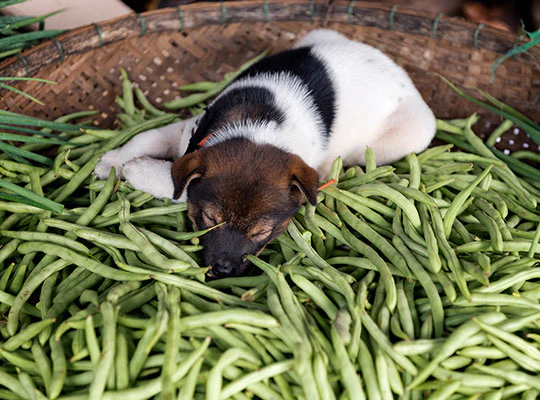Beans are a common staple in many diets, packed with nutrients and fiber. If you're a dog owner, you may wonder if it's safe to share these legumes with your furry friend. While some beans are perfectly safe for dogs, others can pose risks. This article will explore which types of beans are safe for dogs, the potential health benefits, and how to serve them properly.
Are Beans Safe for Dogs?
Yes, many types of beans are safe for dogs when prepared correctly and given in moderation. However, not all beans are suitable, and some can be harmful. The key is knowing which types of beans are safe and how to prepare them.
Health Benefits of Beans for Dogs
-
High in Protein: Beans are a good source of plant-based protein, which supports muscle growth and maintenance.
-
Rich in Fiber: The fiber content in beans can promote healthy digestion and prevent constipation in dogs.
-
Packed with Vitamins and Minerals: Beans contain essential nutrients like iron, potassium, and magnesium, which can contribute to overall health.
-
Low in Fat: Beans are low in fat, making them a healthy treat option for dogs that need to maintain or lose weight.
Types of Beans Safe for Dogs
Here are some types of beans that are safe and beneficial for dogs when cooked and served plain:
- Green Beans: A low-calorie snack that many dogs love. They can be served raw, steamed, or boiled without seasoning.
- Black Beans: Rich in fiber and protein, these beans are safe for dogs when cooked and unseasoned.
- Kidney Beans (Cooked): Full of antioxidants and nutrients, kidney beans are safe for dogs when thoroughly cooked.
- Lentils: Lentils are easy to digest and are an excellent source of protein and fiber for dogs.
- Pinto Beans: These beans offer a good balance of nutrients, including protein and fiber.
- Chickpeas (Garbanzo Beans): Safe when cooked and unseasoned, chickpeas are another healthy option for dogs.
Types of Beans to Avoid
Not all beans are safe for dogs. Avoid these beans as they can cause health issues:
- Baked Beans: These are high in sugar and may contain ingredients like onions and garlic, which are toxic to dogs.
- Canned Beans (with salt or seasoning): Many canned beans contain added salt, spices, or preservatives that are not safe for dogs.
- Raw Kidney Beans: Raw or undercooked kidney beans contain lectin, a toxin that can cause vomiting, diarrhea, and abdominal pain in dogs.
- Refried Beans: Typically loaded with fats and seasonings like garlic and onions, refried beans should be avoided.
How to Serve Beans to Your Dog
If you want to introduce beans into your dog's diet, follow these steps to ensure they are safe and healthy:
-
Cook the Beans: Always cook beans before serving them to your dog. Raw beans can be difficult to digest and may contain harmful compounds.
-
Avoid Seasonings: Do not add salt, spices, onions, garlic, or any other seasonings. Beans should be served plain to avoid gastrointestinal upset or toxicity.
-
Serve in Moderation: Beans are high in fiber, and too much can lead to gas or digestive issues in dogs. A small portion, such as a tablespoon for smaller dogs or two to three tablespoons for larger dogs, is sufficient.
-
Mash or Chop: To prevent choking, especially for smaller dogs, mash or chop the beans into smaller pieces before serving.
Potential Risks of Feeding Beans to Dogs
While beans can offer health benefits, there are some potential risks to be aware of:
-
Gas and Bloating: Beans are known to cause gas in both humans and dogs. Introduce beans gradually to avoid digestive discomfort.
-
High Fiber Content: Too much fiber can lead to loose stools or diarrhea. Monitor your dog’s response to beans and adjust portion sizes accordingly.
-
Weight Gain: While beans are low in fat, they are calorie-dense. If fed in large quantities, they can contribute to weight gain, especially in dogs that are not very active.
When to Avoid Feeding Beans
There are situations where beans may not be the best choice for your dog:
- Dogs with Kidney Problems: High protein and potassium content in beans might not be suitable for dogs with kidney issues. Consult your vet before adding beans to their diet.
- Allergies or Sensitivities: Some dogs may be allergic or sensitive to legumes. Watch for signs of allergic reactions, such as itching, swelling, or gastrointestinal distress.
Healthy Alternatives to Beans
If you're looking for other nutritious snacks for your dog, consider these alternatives:
- Carrots: A low-calorie, crunchy snack that many dogs enjoy.
- Pumpkin: Rich in fiber and vitamins, cooked pumpkin can support digestive health.
- Sweet Potatoes: Cooked and mashed sweet potatoes provide vitamins and fiber while being gentle on the stomach.
Conclusion
In moderation, beans can be a healthy and safe addition to your dog's diet. Stick to types like black beans, green beans, and lentils, and always serve them cooked and unseasoned. While beans can offer various nutritional benefits, it’s important to introduce them slowly and monitor your dog for any digestive issues. When in doubt, consult your veterinarian before making significant changes to your dog's diet.


